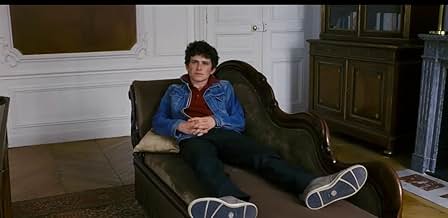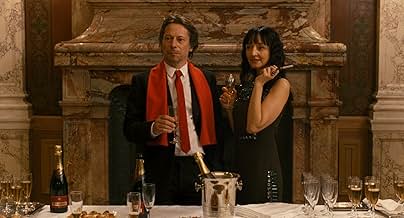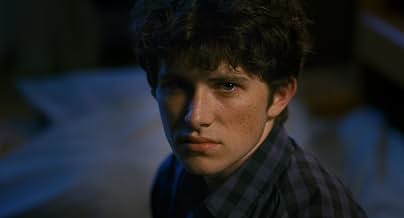अपनी भाषा में प्लॉट जोड़ेंA discontented Parisian teenager in search of a father with (Mathieu Amalric) and (Fabrizio Rongione) as his, respectively, callous and gentle alternative paternal options, and (Natacha Régn... सभी पढ़ेंA discontented Parisian teenager in search of a father with (Mathieu Amalric) and (Fabrizio Rongione) as his, respectively, callous and gentle alternative paternal options, and (Natacha Régnier) as his single mother.A discontented Parisian teenager in search of a father with (Mathieu Amalric) and (Fabrizio Rongione) as his, respectively, callous and gentle alternative paternal options, and (Natacha Régnier) as his single mother.
- पुरस्कार
- 3 जीत और कुल 1 नामांकन
Julia Gros de Gasquet
- Bernadette
- (as Julia de Gasquet)
Tom Darmon
- Premier garçon
- (as Tom Gaspar-Darmon)
कहानी
क्या आपको पता है
- क्रेज़ी क्रेडिटLe rat Gargantua a quitté le tournage en parfaite santé et s'est retiré dans sa villa sur la Côte d'Azur. [In English: The rat Gargantua left the shooting in perfect health and retired to his villa on the French Riviera.]
- कनेक्शनReferences Il deserto rosso (1964)
- साउंडट्रैकDe Lamentatione
[Verset: "Seconde die Lectio Prima"]
Composed by Emilio de' Cavalieri
Performed by Le Poème Harmonique: Claire Lefilliâtre (Dessus), Bruno Le Levreur (Countertenor), Serge Goubioud (Tenor), Jan Van Elsacker (Tenor), Philippe Roche (Bass)
फीचर्ड रिव्यू
The story of the illegitimate child in search of his father has been told and told and told.It has spawned more melodramas than you'll ever see.
Eugene Green has completely renewed this hackneyed subject;his movie looks like no other one,and on the current feel-good French scene ,it's like a bolt from the blue.The viewer may feel bewildered,lost ,searching something vaguely similar to cling to.
Robert Bresson is the first name that comes to mind :the way the actors deliver their lines ,in a neuter almost robotic voice,refusing any dramatization,may put off some people.But if you carry it on,the movie grows on you and culminates in one of the most moving finale I know:Victor Ezenfis 's last shot reflects happiness,nay bliss.
The movie is divided in five chapters ,three inspired by the Old Testament , the others by the Gospels.It's not unwarranted .
Genesis and Exodus are cruel books: Oscar,the wealthy editor , is some kind of Abraham who did not hear God's voice (see Joseph's explanation);in the second part ,he is an equivalent of King Herod. Biblicals references abound.Oscar's and Joseph's father treated his children like Isaac in Genesis ,who favored Jacob and denied Esau's birthright .
The New Testament,on the other hand , is a providential merciful holy scripture ;in Vincent's bedroom,there's Caravaggio's painting which represents Abraham 's sacrifice.When he meets Joseph (the carpenter),both go to a museum and stop in front of Georges De La Tour's painting : a stark contrast to the violence (look at the terrified child's face) of the Italian painting.Although there's a cross on it, Jesus's and Joseph's faces reflect perfect heavenly bliss.
The "golden calf" represents the material world , that of Oscar and his "Bourgeois Bohèmes" ,who drink champagne ,exchanging would be "intellectual" lines -the "critic" who's just talked to late writer Nathalie Sarraute ,it takes the biscuit- , a self-centered selfish milieu.Oscar 's cynicism knows no bounds : not only he cheats on his wife almost in front of her ,but he does not know how many children he fathered!
Natacha Régnier's Mary is the only light in the first chapter : she wants to bring relief ,so she became a nurse .Vincent resents the fact that she has never revealed his father's name : she knows it's beyond her ,that old God of the Old Testament.It takes Joseph to build a true family ,and even if they escape from the powers- that-be on a donkey ,they are stronger than Herod and his cops/soldiers .
Eugene Green achieves the incredible feat of getting a little humor in a rather dry work: both scenes of the guy who sells sperm on internet and needs an associate are a good comic relief in that context ;so are the blue jokes Vincent cracks with his adoptive father.Sometimes,lines which are not funny become so ,by the way they are delivered :"can't you see I'm working?".
That there's only one (non French) comment on such a remarkable movie is amazing .This movie is so rich it deserves hundreds of reviews.Is it a Christian movie,by the way?
Eugene Green has completely renewed this hackneyed subject;his movie looks like no other one,and on the current feel-good French scene ,it's like a bolt from the blue.The viewer may feel bewildered,lost ,searching something vaguely similar to cling to.
Robert Bresson is the first name that comes to mind :the way the actors deliver their lines ,in a neuter almost robotic voice,refusing any dramatization,may put off some people.But if you carry it on,the movie grows on you and culminates in one of the most moving finale I know:Victor Ezenfis 's last shot reflects happiness,nay bliss.
The movie is divided in five chapters ,three inspired by the Old Testament , the others by the Gospels.It's not unwarranted .
Genesis and Exodus are cruel books: Oscar,the wealthy editor , is some kind of Abraham who did not hear God's voice (see Joseph's explanation);in the second part ,he is an equivalent of King Herod. Biblicals references abound.Oscar's and Joseph's father treated his children like Isaac in Genesis ,who favored Jacob and denied Esau's birthright .
The New Testament,on the other hand , is a providential merciful holy scripture ;in Vincent's bedroom,there's Caravaggio's painting which represents Abraham 's sacrifice.When he meets Joseph (the carpenter),both go to a museum and stop in front of Georges De La Tour's painting : a stark contrast to the violence (look at the terrified child's face) of the Italian painting.Although there's a cross on it, Jesus's and Joseph's faces reflect perfect heavenly bliss.
The "golden calf" represents the material world , that of Oscar and his "Bourgeois Bohèmes" ,who drink champagne ,exchanging would be "intellectual" lines -the "critic" who's just talked to late writer Nathalie Sarraute ,it takes the biscuit- , a self-centered selfish milieu.Oscar 's cynicism knows no bounds : not only he cheats on his wife almost in front of her ,but he does not know how many children he fathered!
Natacha Régnier's Mary is the only light in the first chapter : she wants to bring relief ,so she became a nurse .Vincent resents the fact that she has never revealed his father's name : she knows it's beyond her ,that old God of the Old Testament.It takes Joseph to build a true family ,and even if they escape from the powers- that-be on a donkey ,they are stronger than Herod and his cops/soldiers .
Eugene Green achieves the incredible feat of getting a little humor in a rather dry work: both scenes of the guy who sells sperm on internet and needs an associate are a good comic relief in that context ;so are the blue jokes Vincent cracks with his adoptive father.Sometimes,lines which are not funny become so ,by the way they are delivered :"can't you see I'm working?".
That there's only one (non French) comment on such a remarkable movie is amazing .This movie is so rich it deserves hundreds of reviews.Is it a Christian movie,by the way?
- dbdumonteil
- 7 अक्तू॰ 2017
- परमालिंक
टॉप पसंद
रेटिंग देने के लिए साइन-इन करें और वैयक्तिकृत सुझावों के लिए वॉचलिस्ट करें
विवरण
बॉक्स ऑफ़िस
- US और कनाडा में सकल
- $30,588
- दुनिया भर में सकल
- $38,774
- चलने की अवधि1 घंटा 53 मिनट
- रंग
- पक्ष अनुपात
- 1.85 : 1
इस पेज में योगदान दें
किसी बदलाव का सुझाव दें या अनुपलब्ध कॉन्टेंट जोड़ें
























